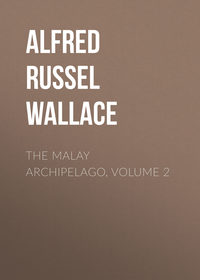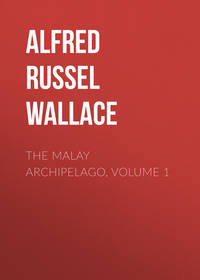 полная версия
полная версияTravels on the Amazon
The men of Javíta when at work wear only the "tanga," in other respects being entirely naked. The women wear usually a large wrapping dress passing over the left shoulder but leaving the right arm perfectly free, and hanging loosely over their whole person. On Sundays and festivals they have well-made cotton gowns, and the men a shirt and trousers. Here exists the same custom as at São Carlos, of the girls and boys assembling morning and evening at the church to sing a hymn or psalm. The village is kept remarkably clean and free from weeds by regular weekly hoeings and weedings, to which the people are called by the Capitãos, who are the executive officers under the Commissario.
My evenings were very dull, having few to converse with, and no books. Now and then I would talk a little with the Commissario, but our stock of topics was soon exhausted. One or two evenings I went to their festas, when they had made a quantity of "xirac"—the caxirí of the Brazilian Indians—and were very merry. They had a number of peculiar monotonous dances, accompanied by strange figures and contortions. The young girls generally came neatly dressed, their glossy hair beautifully plaited, and with gay ribbons or flowers to set it off. The moment the xirac is finished the party breaks up, as they do not seem to think it possible to dance without it: sometimes they make enough to last two or three days. Their dances appear quite national, but they have apparently left off paint, as I saw very little used.
The language spoken by these people is called the Maniva or Baniwa, but it differs considerably from the Baniwa of the Rio Negro, and is not so harsh and guttural. At Tómo and Maróa another language is spoken, quite distinct from this, but still called the Baniwa; a little further down, at São Carlos, the Barré is used; so that almost every village has its language. Here the men and old women all speak Spanish tolerably, there having formerly been priests living at the Convento, who instructed them. The younger women and the boys and girls, not having had this advantage, speak only the native tongue; but many of them can understand a little Spanish. I found considerable difficulty in making myself intelligible here. The white men, who are called "rationáles" (rationals), could understand my mixed Portuguese and Spanish very well, but the Indians, knowing but little Spanish themselves, cannot of course comprehend any deviations from the ordinary method of speaking. I found it necessary, therefore, to keep my Spanish by itself, as they could better understand a little and good, than a great deal of explanation in the mixed tongue.
Some of my dull and dreary evenings I occupied in writing a description of the village and its inhabitants, in what may probably be very dreary blank verse; but as it shows my ideas and thoughts at the time, I may as well give it the reader in place of the more sober and matter-of-fact view of the matter I should probably take now. I give it as I wrote it, in a state of excited indignation against civilised life in general, got up to relieve the monotony of my situation, and not altogether as my views when writing in London in 1853.
A DESCRIPTION OF JAVÍTA"'Tis where the streams divide, to swell the floodsOf the two mighty rivers of our globe;Where gushing brooklets in their narrow bedsLie hid, o'ershadow'd by th' eternal woods,And trickle onwards,—these to increase the waveOf turbid Orinooko; those, by a longer courseIn the Black River's isle-strewn bed, flow downTo mighty Amazon, the river-king,And, mingled with his all-engulfing stream,Go to do battle with proud Ocean's self,And drive him back even from his own domain.There is an Indian village; all around,The dark, eternal, boundless forest spreadsIts varied foliage. Stately palm-trees riseOn every side, and numerous trees unknownSave by strange names uncouth to English ears.Here I dwelt awhile the one white manAmong perhaps two hundred living souls.They pass a peaceful and contented life,These black-hair'd, red-skinn'd, handsome, half-wild men.Directed by the sons of Old Castile,They keep their village and their houses clean;And on the eve before the Sabbath-dayAssemble all at summons of a bell,To sweep within and all around their church,In which next morn they meet, all neatly dress'd,To pray as they've been taught unto their God.It was a pleasing sight, that Sabbath morn,Reminding me of distant, dear-loved home.On one side knelt the men, their simple dressA shirt and trousers of coarse cotton cloth:On the other side were women and young girls,Their glossy tresses braided with much taste,And on their necks all wore a kerchief gay,And some a knot of riband in their hair.How like they look'd, save in their dusky skin,To a fair group of English village maids!Yet far superior in their graceful forms;For their free growth no straps or bands impede,But simple food, free air, and daily bathsAnd exercise, give all that Nature asksTo mould a beautiful and healthy frame.Each day some labour calls them. Now they goTo fell the forest's pride, or in canoeWith hook, and spear, and arrow, to catch fish;Or seek the various products of the wood,To make their baskets or their hanging beds.The women dig the mandiocca root,And with much labour make of it their bread.These plant the young shoots in the fertile earth—Earth all untill'd, to which the plough, or spade,Or rake, or harrow, are alike unknown.The young girls carry water on their headsIn well-formed pitchers, just like Cambrian maids;And all each morn and eve wash in the stream,And sport like mermaids in the sparkling wave.The village is laid out with taste and skill:In the midst a spacious square, where stands the church,And narrow streets diverging all around.Between the houses, filling up each space,The broad, green-leaved, luxuriant plantain grows,Bearing huge bunches of most wholesome fruit;The orange too is there, and grateful lime;The Inga pendent hangs its yard-long pods(Whose flowers attract the fairy humming-birds);The guava, and the juicy, sweet cashew,And a most graceful palm, which bears a fruitIn bright red clusters, much esteem'd for food;And there are many more which IndiansEsteem, and which have only Indian names.The houses are of posts fill'd up with mud,Smooth'd, and wash'd over with a pure white clay;A palm-tree's spreading leaves supply a thatchImpervious to the winter's storms and rain.No nail secures the beams or rafters, allIs from the forest, whose lithe, pendent cordsBind them into a firm enduring mass.From the tough fibre of a fan-palm's leafThey twist a cord to make their hammock-bed,Their bow-string, line, and net for catching fish.Their food is simple—fish and cassava-bread,With various fruits, and sometimes forest game,All season'd with hot, pungent, fiery peppers.Sauces and seasonings too, and drinks they have,Made from the mandiocca's poisonous juice;And but one foreign luxury, which is salt.Salt here is money: daily they bring to meCassava cakes, or fish, or ripe bananas,Or birds or insects, fowls or turtles' eggs,And still they ask for salt. Two teacups-fullBuy a large basket of cassava cakes,A great bunch of bananas, or a fowl.One day they made a festa, and, just likeOur villagers at home, they drank much beer,(Beer made from roasted mandiocca cakes,)Call'd here "shirac," by others "caxiri,"But just like beer in flavour and effect;And then they talked much, shouted and sang,And men and maids all danced in a ringWith much delight, like children at their play.For music they've small drums and reed-made fifes.And vocal chants, monotonous and shrill,To which they'll dance for hours without fatigue.The children of small growth are naked, andThe boys and men wear but a narrow cloth.How I delight to see those naked boys!Their well-form'd limbs, their bright, smooth, red-brown skin,And every motion full of grace and health;And as they run, and race, and shout, and leap,Or swim and dive beneath the rapid stream,Or, all bareheaded in the noonday sun,Creep stealthily, with blowpipe or with bow,To shoot small birds or swiftly gliding fish,I pity English boys; their active limbsCramp'd and confined in tightly-fitting clothes;Their toes distorted by the shoemaker,Their foreheads aching under heavy hats,And all their frame by luxury enervate.But how much more I pity English maids,Their waist, and chest, and bosom all confinedBy that vile torturing instrument called stays!And thus these people pass their simple lives.They are a peaceful race; few serious crimesAre known among them; they nor rob nor murder,And all the complicated villaniesOf man called civilised are here unknown.Yet think not I would place, as some would do,The civilised below the savage man;Or wish that we could retrograde, and liveAs did our forefathers ere Cæsar came.'Tis true the miseries, the wants and woes,The poverty, the crimes, the broken hearts,The intense mental agonies that leadSome men to self-destruction, someTo end their days within a madhouse cell,The thousand curses that gold brings upon us,The long death-struggle for the means to live,—All these the savage knows and suffers not.But then the joys, the pleasures and delights,That the well-cultivated mind enjoys;The appreciation of the beautifulIn nature and in art; the boundless rangeOf pleasure and of knowledge books afford;The constant change of incident and sceneThat makes us live a life in every year;—All these the savage knows not and enjoys not.Still we may ask, 'Does stern necessityCompel that this great good must co-existFor ever with that monstrous mass of ill?Must millions suffer these dread miseries,While but a few enjoy the grateful fruits?'For are there not, confined in our dense towns,And scattered over our most fertile fields,Millions of men who live a lower life—Lower in physical and moral health—Than the Red Indian of these trackless wilds?Have we not thousands too who live a lifeMore low, through eager longing after gold,—Whose thoughts, from morn to night, from night to morn,Are—how to get more gold?What know such men of intellectual joys?They've but one joy—the joy of getting gold.In nature's wondrous charms they've no delight,The one thing beautiful for them is—gold.Thoughts of the great of old which books contain,The poet's and the historian's fervid page,Or all the wonders science brings to light,For them exist not. They've no time to spendIn such amusements: 'Time,' say they, 'is gold.'And if they hear of some immortal deed,Some noble sacrifice of power or fortuneTo save a friend or spotless reputation,—A deed that moistens sympathetic eyes,And makes us proud we have such fellow-men,—They say, 'Who make such sacrifice are fools,For what is life without one's hard-earn'd gold?'Rather than live a man like one of these,I'd be an Indian here, and live contentTo fish, and hunt, and paddle my canoe,And see my children grow, like young wild fawns,In health of body and in peace of mind,Rich without wealth, and happy without gold!"A. W.Javíta, March, 1851.
I had gone on here in my regular routine some time, when one morning, on getting up, I found none of the Indians, and no fire in the verandah. Thinking they had gone out early to hunt or fish, as they sometimes did, I lit the fire and got my breakfast, but still no sign of any of them. Looking about, I found that their hammocks, knives, an earthen pan, and a few other articles, were all gone, and that nothing was left in the house but what was my own. I was now convinced that they had run away in the night, and left me to get on as I could. They had been rather uneasy for some days past, asking me when I meant to go back. They did not like being among people whose language they could not speak, and had been lately using up an enormous quantity of farinha, hoping when they had finished the last basket that I should be unable to purchase any more in the village, and should therefore be obliged to return. The day before I had just bought a fresh basket, and the sight of that appears to have supplied the last stimulus necessary to decide the question, and make them fly from the strange land and still stranger white man, who spent all his time in catching insects, and wasting good caxaça by putting fish and snakes into it. However, there was now nothing to be done, so I took my insect-net, locked up my house, put the key (an Indian-made wooden one) in my pocket, and started off for the forest.
I had luckily, a short time before, bought a fine Venezuelan cheese and some dried beef, so that, with plenty of cassava-bread and plantains, I could get on very well. In the evening some of my usual visitors among the Indians dropped in, and were rather surprised to see me lighting my fire and preparing my dinner; and on my explaining the circumstances to them, they exclaimed that my Indians were "mala gente" (bad fellows), and intimated that they had always thought them no better than they should be. I got some of the boys to fetch me water from the river, and to bring me in a stock of fuel, and then, with coffee and cheese, roasted plantains and cassava-bread, I lived luxuriously. My coffee, however, was just finished, and in a day or two I had none. This I could hardly put up with without a struggle, so I went down to the cottage of an old Indian who could speak a little Spanish, and begged him, "por amor de Dios," to get me some coffee from a small plantation he had. There were some ripe berries on the trees, the sun was shining out, and he promised to set his little girl to work immediately. This was about ten in the morning. I went into the forest, and by four returned, and found that my coffee was ready. It had been gathered, the pulp washed off, dried in the sun (the longest part of the business), husked, roasted, and pounded in a mortar; and in half an hour more I enjoyed one of the most delicious cups of coffee I have ever tasted.
As I wanted to remain a fortnight longer, I tried to persuade one of the brown damsels of the village to come and make my fire and cook for me; but, strange to say, not one would venture, though in the other villages of the Rio Negro I might at any moment have had my choice of half a dozen; and I was forced to be my own cook and housemaid for the rest of my stay in Javíta.
There was now in the village an old Indian trader who had come from Medina, a town at the foot of the Andes, near Bogotá, and from him and some other Indians I obtained much information relative to that part of the country, and the character of the streams that flow from the mountains down to the Orinooko. He informed me that he had ascended by the river Muco, which enters the Orinooko above the Falls of Maypures, and by which he had reached a point within twenty miles of the upper waters of the Meta, opposite Medina. The river Muco had no falls or obstructions to navigation, and all the upper part of its course flowed through an open country, and had fine sandy beaches; so that between this river and the Guaviare is the termination of the great forest of the Amazon valley.
The weather was now terribly wet. For successive days and nights rain was incessant, and a few hours of sunshine was a rarity. Insects were few, and those I procured it was almost impossible to dry. In the drying box they got destroyed by mould, and if placed in the open air and exposed to the sun minute flies laid eggs upon them, and they were soon eaten up by maggots. The only way I could preserve them was to hang them up some time every evening and morning over my fire. I now began to regret more than ever my loss of the fine season, as I was convinced that I could have reaped a splendid harvest. I had, too, just began to initiate the Indian boys into catching beetles for me, and was accumulating a very nice collection. Every evening three or four would come in with their treasures in pieces of bamboo, or carefully tied up in leaves. I purchased all they brought, giving a fish-hook each; and among many common I generally found some curious and rare species. Coleoptera, generally so scarce in the forest districts of the Amazon and Rio Negro, seemed here to become more abundant, owing perhaps to our approach to the margins of the great forest, and the plains of the Orinooko.
I prepared to leave Javíta with much regret. Although, considering the season, I had done well, I knew that had I been earlier I might have done much better. In April I had arranged to go up the unexplored Uaupés with Senhor L., and even the prospect of his conversation was agreeable after the weary solitude I was exposed to here.
I would, however, strongly recommend Javíta to any naturalist wishing for a good unexplored locality in South America. It is easily reached from the West Indies to Angostura, and thence up the Orinooko and Atabápo. A pound's worth of fish-hooks, and five pounds laid out in salt, beads, and calico, will pay all expenses there for six months. The traveller should arrive in September, and can then stay till March, and will have the full benefit of the whole of the dry season. The insects alone would well repay any one; the fishes are also abundant, and very new and interesting; and, as my collections were lost on the voyage home, they would have all the advantage of novelty.
On the 31st of March I left Javíta, the Commissario having sent five or six Indians to carry my luggage, four of whom were to proceed with me to Tómo. The Indians of São Carlos, Tómo, and Maróa had been repairing their part of the road, and were returning home, so some of them agreed to go with me in the place of the Javítanos. They had found in the forest a number of the harlequin beetles (Acrocinus longimanus), which they offered me, carefully wrapped up in leaves; I bought five for a few fish-hooks each. On arriving at Pimichin the little river presented a very different appearance from what it had when I last saw it. It was now brim-full, and the water almost reached up to our shed, which had before been forty yards off, up a steep rocky bank. Before my men ran away I had sent two of them to Tómo to bring my canoe to Pimichin, the river having risen enough to allow it to come up, and I now found it here. They had taken a canoe belonging to Antonio Dias, who had passed Javíta a few days before on his way to São Fernando, so that when he returned he had to borrow another to go home in.
We descended the little river rapidly, and now saw the extraordinary number of bends in it. I took the bearings of thirty with the compass, but then there came on a tremendous storm of wind and rain right in our faces, which rendered it quite impossible to see ahead. Before this had cleared off night came on, so that the remainder of the bends and doubles of the Pimichin river must still remain in obscurity. The country it flows through appears to be a flat sandy tract, covered with a low scrubby vegetation, very like that of the river Cobáti, up which I ascended to the Serra to obtain the cocks of the rock.
It was night when we reached Maróa, and we were nearly passing the village without seeing it. We went to the "casa de nação," rather a better kind of shed than usual, and, making a good fire, passed a comfortable night. The next morning I called on Senhor Carlos Bueno (Charles Good), the dandy Indian Commissario, and did a little business with him. I bought a lot of Indian baskets, gravatánas, quivers, and ururí or curarí poison, and in return gave him some fish-hooks and calico, and, having breakfasted with him, went on to Tómo.
Senhor Antonio Dias was not there, having gone to São Carlos, so I determined to wait a few days for his return, as he had promised to send men with me to Guia. I took up my abode with Senhor Domingos, who was busy superintending the completion of the large vessel before mentioned, in order to get it launched with the high water, which was now within a foot or two of its bottom. I amused myself walking about the campo with my gun, and succeeded in shooting one of the beautiful little black-headed parrots, which have the most brillant green plumage, crimson under-wings, and yellow cheeks; they are only found in these districts, and are rather difficult to obtain. I also got some curious fish to figure,—in particular two large species of Gymnotus, of the group which are not electric.
The Indians had a festa while I was here. They made abundance of "shirac," and kept up their dancing for thirty hours. The principal peculiarity of it was that they mixed up their civilised dress and their Indian decorations in a most extraordinary manner. They all wore clean trousers and white or striped shirts; but they had also feather-plumes, bead necklaces, and painted faces, which made altogether a rather queer mixture. They also carried their hammocks like scarfs over their shoulders, and had generally hollow cylinders in their hands, used to beat upon the ground in time to the dancing. Others had lances, bows, and wands, ornamented with feathers, producing as they danced in the moonlight a singular and wild appearance.
Senhor Antonio Dias delayed his return, and rather a scene in his domestic circle took place in consequence. As might be expected, the ladies did not agree very well together. The elder one in particular was very jealous of the Indian girls, and took every opportunity of ill-treating them, and now that the master was absent went, I suppose, to greater lengths than usual; and the consequence was, one of the girls ran away. This was an unexpected dénouement, and they were in a great state of alarm, for the girl was a particular favourite of Senhor Antonio's, and if he returned before she came back he was not likely to be very delicate in showing his displeasure. The girl had gone off in a canoe with a child about a year old; the night had been stormy and wet, but that sort of thing will not stop an Indian. Messengers were sent after her, but she was not to be found; and then the old lady and her daughter went off themselves in a tremendous rain, but with no better success. One resource more, however, remained, and they resolved to apply to the Saints. Senhor Domingos was sent to bring the image of St. Antonio from the church. This saint is supposed to have especial power over things lost, but the manner of securing his influence is rather singular:—the poor saint is tied round tightly with a cord and laid on his back on the floor, and it is believed that in order to obtain deliverance from such durance vile he will cause the lost sheep to return. Thus was the unfortunate St. Antony of Tómo now treated, and laid ignominiously on the earthen floor all night, but without effect; he was obstinate, and nothing was heard of the wanderer. More inquiries were made, but with no result, till two days afterwards Senhor Antonio himself returned accompanied by the girl. She had hid herself in a sitio a short distance from the village, waited for Senhor Antonio's passing, and then joined him, and told her own story first; and so the remainder of the harem got some hard words, and I am inclined to think some hard blows too.
Before leaving Tómo, I purchased a pair of the beautiful feather-work borders, before alluded to, for which I paid £3 in silver dollars. Five Indians were procured to go with me, and at the same time take another small canoe, in which to bring back several articles that Senhor Antonio was much in want of. We paid the men between us, before going, with calicoes and cotton cloth, worth in England about twopence a yard, but here valued at 2s. 6d., and soap, beads, knives, and axes, in the same proportion. On the way, I got these Tómo Indians to give me a vocabulary of their language, which differs from that of the villages above and below them. We paddled by day, and floated down by night; and as the current was now tremendous, we got on so quickly, that in three days we reached Marabitanas, a distance which had taken us nine in going up.
Here I stayed a week with the Commandante, who had invited me when at Guia. I, however, did little in the collecting way: there were no paths in the forest, and no insects, and very few birds worth shooting. I obtained some very curious half-spiny rodent animals, and a pretty white-marked bird, allied to the starlings, which appears here only once a year in flocks, and is called "Ciucí uera" (the star-bird).
The inhabitants of Marabitanas are celebrated for their festas: their lives are spent, half at their festas, and the other half in preparing for them. They consume immense quantities of raw spirit, distilled from cane-juice and from the mandiocca: at a festa which took place while I was here, there was about a hogshead of strong spirit consumed, all drunk raw. In every house, where the dancing takes place, there are three or four persons constantly going round with a bottle and glass, and no one is expected ever to refuse; they keep on the whole night, and the moment you have tasted one glass, another succeeds, and you must at least take a sip of it. The Indians empty the glass every time; and this continues for two or three days. When all is finished, the inhabitants return to their sitios, and commence the preparation of a fresh lot of spirit for the next occasion.









